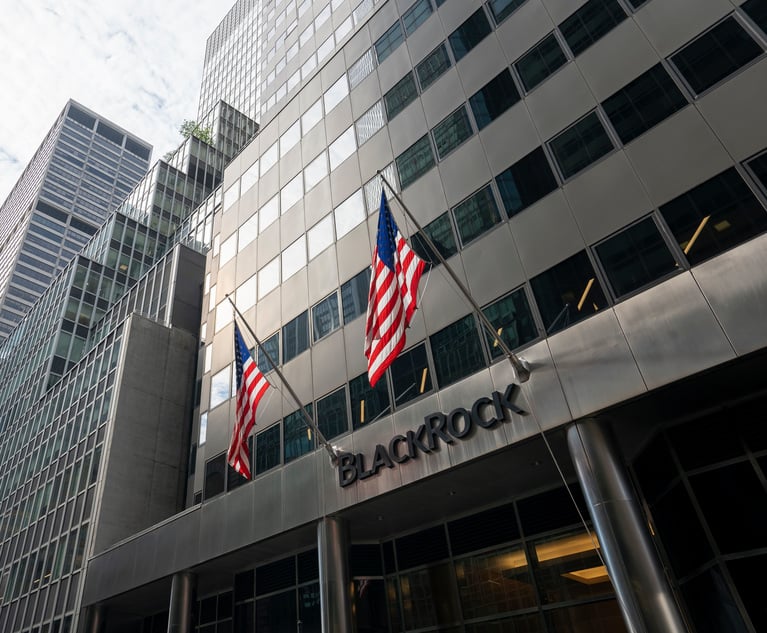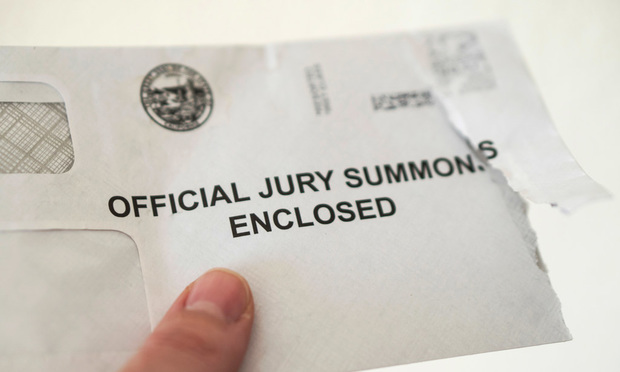Opioid Companies Want to Know Why 500 Jurors Were Dismissed From Upcoming Trial
Corporate defendants facing the first jury trial over the opioid crisis, such as Johnson & Johnson and McKesson, plan to challenge the jury selection process after court officials dismissed 70% of the prospective jurors from service this month.
September 23, 2019 at 03:39 PM
4 minute read
Corporate defendants facing the first jury trial over the opioid crisis plan to challenge the jury selection process after court officials dismissed 70% of the prospective jurors from service this month.
In a Sept. 20 filing, Johnson & Johnson, McKesson Corp. and other companies sought court records outlining details about the 1,000 prospective jurors who received summonses and why court officials dismissed 500 of the 725 who returned their summonses from service relating to an Oct. 21 trial in Cleveland.
"Of the pre-screening questionnaires returned, roughly 500 jurors—nearly 70% of responding potential jurors—have been excused, deferred, and/or exempted for unknown reasons," their lawyers wrote.
They cited a provision in the Jury Selection and Service Act that allows access to such court records in preparation for filing a motion to halt proceedings due to a "substantial failure" in the jury selection process.
Plaintiffs attorneys in the upcoming trial did not respond to a request for comment.
The trial, expected to last eight weeks, presents the first time a jury will decide who caused the opioid crisis. Earlier this year, a judge in Oklahoma's Cleveland County District Court awarded $572 million to the state's attorney general in a bench trial alleging that Johnson & Johnson, whose Janssen Pharmaceuticals unit manufactured opiate pharmaceuticals, created a public nuisance.
Next month's trial also is the first in federal court and comes in the multidistrict litigation that encompasses 2,000 other lawsuits by cities and counties across the nation. Two Ohio counties, represented by lead plaintiffs counsel in the multidistrict litigation, are set to go to trial against several manufacturers and distributors of opiate pharmaceuticals, and Walgreens, which sold them. Some manufacturers, such as Purdue Pharma, have agreed to settle out of the trial.
According to last week's filing, Johnson & Johnson's lawyers raised the issue about the pre-screening of jurors at a Sept. 16 telephone hearing. U.S. District Judge Dan Polster of the Northern District of Ohio referred them to the jury department, which revealed that court officials had eliminated 70% of the jurors who responded to summons.
Among the records sought are documents about the court's process of selecting and excusing the prospective jurors, demographic information, responses and communications.
The filing comes as Johnson & Johnson has challenged a ruling last month by Polster, who is overseeing the multidistrict litigation, that would allow a jury to decide whether the defendants created a public nuisance but give the judge the role of determining the amount of abatement costs needed to fix the crisis. Plaintiffs attorneys plan to ask for $8 billion.
Having a jury decide public nuisance, Johnson & Johnson's lawyer wrote in a Sept. 19 memorandum, would create confusion among the jurors, who would hear "emotionally charged and prejudicial evidence" before reaching a verdict on other claims, such as violations of the U.S. Racketeer Influenced and Corrupt Organizations, or RICO, Act.
"Doing so would only inflame jurors against defendants and increase the chances of unjustified, emotionally driven liability determinations on the RICO and conspiracy claims," wrote Charles Lifland of O'Melveny & Myers.
Distributors have not objected to Polster's ruling on the public nuisance claim but have brought a motion to recuse the judge. In that motion, they claim Polster has appeared partial by continually pushing for settlement, most recently by approving an unprecedented "negotiation" class to resolve all the cases, and in his remarks to the press. Such partiality, they wrote, raised questions about having Polster decide potential abatement costs tied to a jury's verdict on public nuisance.
"A reasonable person would question whether a court that has repeatedly spoken to what it believes to be the scope of the problem and whose stated goal is to provide money to government agencies to resolve that problem as quickly as possible can do so impartially," they wrote in a Sept. 14 motion.
Plaintiffs attorneys have countered that the recusal motion is untimely and incorrectly interprets the judge's comments.
"The defendants' disappointment with specific rulings, or with the outcome to date of the resolution track, or most centrally that a trial is imminent, is therefore no basis for recusal, especially in the absence of any timely attempt to raise or resolve the issue," they wrote.
This content has been archived. It is available through our partners, LexisNexis® and Bloomberg Law.
To view this content, please continue to their sites.
Not a Lexis Subscriber?
Subscribe Now
Not a Bloomberg Law Subscriber?
Subscribe Now
NOT FOR REPRINT
© 2025 ALM Global, LLC, All Rights Reserved. Request academic re-use from www.copyright.com. All other uses, submit a request to [email protected]. For more information visit Asset & Logo Licensing.
You Might Like
View All
Apple Disputes 'Efforts to Manufacture' Imaging Sensor Claims Against iPhone 15 Technology

Special Counsel Jack Smith Prepares Final Report as Trump Opposes Its Release
4 minute read

Who Got the Work: Gibson Dunn and Wilmer to Defend BlackRock in ESG Antitrust Lawsuit
2 minute readTrending Stories
- 1Supreme Court Takes Up Challenge to ACA Task Force
- 2'Tragedy of Unspeakable Proportions:' Could Edison, DWP, Face Lawsuits Over LA Wildfires?
- 3Meta Pulls Plug on DEI Programs
- 4On the Move and After Hours: Meyner and Landis; Cooper Levenson; Ogletree Deakins; Saiber
- 5State Budget Proposal Includes More Money for Courts—for Now
Who Got The Work
Michael G. Bongiorno, Andrew Scott Dulberg and Elizabeth E. Driscoll from Wilmer Cutler Pickering Hale and Dorr have stepped in to represent Symbotic Inc., an A.I.-enabled technology platform that focuses on increasing supply chain efficiency, and other defendants in a pending shareholder derivative lawsuit. The case, filed Oct. 2 in Massachusetts District Court by the Brown Law Firm on behalf of Stephen Austen, accuses certain officers and directors of misleading investors in regard to Symbotic's potential for margin growth by failing to disclose that the company was not equipped to timely deploy its systems or manage expenses through project delays. The case, assigned to U.S. District Judge Nathaniel M. Gorton, is 1:24-cv-12522, Austen v. Cohen et al.
Who Got The Work
Edmund Polubinski and Marie Killmond of Davis Polk & Wardwell have entered appearances for data platform software development company MongoDB and other defendants in a pending shareholder derivative lawsuit. The action, filed Oct. 7 in New York Southern District Court by the Brown Law Firm, accuses the company's directors and/or officers of falsely expressing confidence in the company’s restructuring of its sales incentive plan and downplaying the severity of decreases in its upfront commitments. The case is 1:24-cv-07594, Roy v. Ittycheria et al.
Who Got The Work
Amy O. Bruchs and Kurt F. Ellison of Michael Best & Friedrich have entered appearances for Epic Systems Corp. in a pending employment discrimination lawsuit. The suit was filed Sept. 7 in Wisconsin Western District Court by Levine Eisberner LLC and Siri & Glimstad on behalf of a project manager who claims that he was wrongfully terminated after applying for a religious exemption to the defendant's COVID-19 vaccine mandate. The case, assigned to U.S. Magistrate Judge Anita Marie Boor, is 3:24-cv-00630, Secker, Nathan v. Epic Systems Corporation.
Who Got The Work
David X. Sullivan, Thomas J. Finn and Gregory A. Hall from McCarter & English have entered appearances for Sunrun Installation Services in a pending civil rights lawsuit. The complaint was filed Sept. 4 in Connecticut District Court by attorney Robert M. Berke on behalf of former employee George Edward Steins, who was arrested and charged with employing an unregistered home improvement salesperson. The complaint alleges that had Sunrun informed the Connecticut Department of Consumer Protection that the plaintiff's employment had ended in 2017 and that he no longer held Sunrun's home improvement contractor license, he would not have been hit with charges, which were dismissed in May 2024. The case, assigned to U.S. District Judge Jeffrey A. Meyer, is 3:24-cv-01423, Steins v. Sunrun, Inc. et al.
Who Got The Work
Greenberg Traurig shareholder Joshua L. Raskin has entered an appearance for boohoo.com UK Ltd. in a pending patent infringement lawsuit. The suit, filed Sept. 3 in Texas Eastern District Court by Rozier Hardt McDonough on behalf of Alto Dynamics, asserts five patents related to an online shopping platform. The case, assigned to U.S. District Judge Rodney Gilstrap, is 2:24-cv-00719, Alto Dynamics, LLC v. boohoo.com UK Limited.
Featured Firms
Law Offices of Gary Martin Hays & Associates, P.C.
(470) 294-1674
Law Offices of Mark E. Salomone
(857) 444-6468
Smith & Hassler
(713) 739-1250









